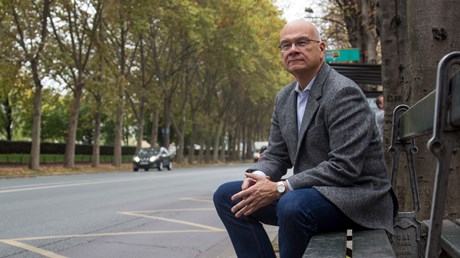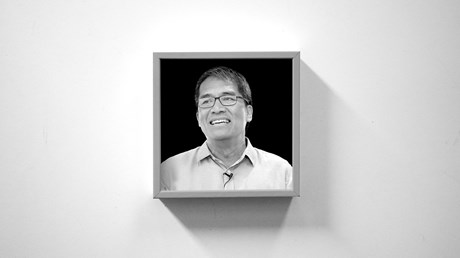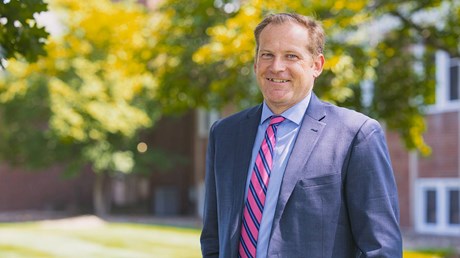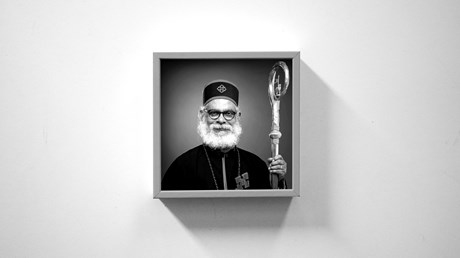Searched: Not
News
 Israel is not as secure as many thought, but the people are much stronger and more dedicated than most imagined. Israel is not as secure as many thought, but the people are much stronger and more dedicated than most imagined. |
The wager only scratches the surface of his relevance to a post-Christian era.
 It is a common lament that we live in a post-Christian era. This fact raises challenges to our witness to the world. Most of our audience thinks that, in G. K. Chesterton’s words, Christianity has been tried and found wanting (rather than found wanting and left untried). It is not considered a live option. How do we bear witness well in this cultural context? We might do well to reconsider one of the most enigmatic thinkers in Christian history, Blaise Pascal.Pascal suffers from a public relations problem. As the source of Pascal’s wager, he is often considered a gambling man. He urges the non-believer to bet that God exists. What does one have to lose? In Beyond the Wager: The Christian Brilliance of Blaise Pascal, philosopher Douglas Groothuis shows that there is more to Pascal’s life and thought than his most famous argument. Groothuis demonstrates that we have much to learn from this brilliant thinker. Pascal, he argues, is a crucial thinker for our time.Essential writingsPascal came on the scene in the 17th century, during the early years of the Scientific Revolution. Several of his works contributed to this movement, including treatises on the geometry of conic sections, theories of probability, and conclusions to extensive experiments he had done to test the possibility of a vacuum. He invented the first functional calculator, which he had built to help his father with his work of assessing taxes.His best-known works, however, focus on Christianity. In the Provincial Letters, Pascal defends the Jansenist movement, which was condemned by the Catholic church, against the Jesuits. The Jansenists emphasized that the depth of human sinfulness required a work of God for our salvation. The Christian life ...Continue reading... It is a common lament that we live in a post-Christian era. This fact raises challenges to our witness to the world. Most of our audience thinks that, in G. K. Chesterton’s words, Christianity has been tried and found wanting (rather than found wanting and left untried). It is not considered a live option. How do we bear witness well in this cultural context? We might do well to reconsider one of the most enigmatic thinkers in Christian history, Blaise Pascal.Pascal suffers from a public relations problem. As the source of Pascal’s wager, he is often considered a gambling man. He urges the non-believer to bet that God exists. What does one have to lose? In Beyond the Wager: The Christian Brilliance of Blaise Pascal, philosopher Douglas Groothuis shows that there is more to Pascal’s life and thought than his most famous argument. Groothuis demonstrates that we have much to learn from this brilliant thinker. Pascal, he argues, is a crucial thinker for our time.Essential writingsPascal came on the scene in the 17th century, during the early years of the Scientific Revolution. Several of his works contributed to this movement, including treatises on the geometry of conic sections, theories of probability, and conclusions to extensive experiments he had done to test the possibility of a vacuum. He invented the first functional calculator, which he had built to help his father with his work of assessing taxes.His best-known works, however, focus on Christianity. In the Provincial Letters, Pascal defends the Jansenist movement, which was condemned by the Catholic church, against the Jesuits. The Jansenists emphasized that the depth of human sinfulness required a work of God for our salvation. The Christian life ...Continue reading... |
For seven seasons, the show has offered a clichéd (and nostalgic) vision of how atheists and believers relate to each other.
 My mom was the one who told me to watch The Big Bang Theory. It was a show about nerds—and I was a nerd. She thought I’d enjoy it. A friend had already mentioned that the main character, Sheldon Cooper, was “exactly like” me. After I watched the show, at Mom’s encouragement, I joked that I had mixed feelings about the comparison.The Big Bang Theory was extremely popular and not just with my mom; at its height, it averaged 20 million viewers a night. But it never really resonated with actual dweebs. Its audience was largely Gen X women—not people who were Sheldon but people who “knew a Sheldon,” not the geeks themselves but their mothers and friends.It’s fitting, then, that the even-more-popular Big Bang spinoff would be Young Sheldon, a prequel about the title character’s childhood in East Texas—and that Sheldon’s relationship with his mom, Mary, would be at the heart of the show. Young Sheldon sits at the top of the prime-time rankings; one recent week, the show (which streams on Netflix, Max, and Paramount+) topped all streamed content across US household televisions.As Young Sheldon comes to an end (its series finale airs May 16; a spinoff starring two breakout characters—Georgie and Mandy—has already been announced), so too does the onscreen dynamic between Sheldon and Mary. So too does a nostalgic vision for how the “science vs. religion” debate plays out in our families.Mary is Sheldon’s opposite in nearly every way. He’s a logical atheist physicist with no people skills; Mary is a warm, folksy conservative Christian. In many ways, she serves as an audience surrogate. (For what it’s worth, Mary was my ...Continue reading... My mom was the one who told me to watch The Big Bang Theory. It was a show about nerds—and I was a nerd. She thought I’d enjoy it. A friend had already mentioned that the main character, Sheldon Cooper, was “exactly like” me. After I watched the show, at Mom’s encouragement, I joked that I had mixed feelings about the comparison.The Big Bang Theory was extremely popular and not just with my mom; at its height, it averaged 20 million viewers a night. But it never really resonated with actual dweebs. Its audience was largely Gen X women—not people who were Sheldon but people who “knew a Sheldon,” not the geeks themselves but their mothers and friends.It’s fitting, then, that the even-more-popular Big Bang spinoff would be Young Sheldon, a prequel about the title character’s childhood in East Texas—and that Sheldon’s relationship with his mom, Mary, would be at the heart of the show. Young Sheldon sits at the top of the prime-time rankings; one recent week, the show (which streams on Netflix, Max, and Paramount+) topped all streamed content across US household televisions.As Young Sheldon comes to an end (its series finale airs May 16; a spinoff starring two breakout characters—Georgie and Mandy—has already been announced), so too does the onscreen dynamic between Sheldon and Mary. So too does a nostalgic vision for how the “science vs. religion” debate plays out in our families.Mary is Sheldon’s opposite in nearly every way. He’s a logical atheist physicist with no people skills; Mary is a warm, folksy conservative Christian. In many ways, she serves as an audience surrogate. (For what it’s worth, Mary was my ...Continue reading... |
For all his greatness, we should most seek to imitate the late pastor's humility and indifference to fame.
 In spring of last year, many of us saw a photo of the late Timothy Keller sitting on a park bench. The photo was used on the cover of Collin Hansen’s biography of Keller, and it circulated around the internet in May when he passed away—on social media, blogs, and even Keller’s personal website.What most of us didn’t see, however, was the banana peel lying on the bench only a couple feet from Keller. The peel has been cropped from most versions of the photo, and understandably so. Who wants to see an ugly brown bit of organic waste in an author’s photograph?I confess that if I were a world-famous pastor and best-selling author having my picture taken by a professional photographer, I would most certainly have moved the banana peel before someone took my picture. Who wouldn’t? But Keller didn’t seem to care.I believe this points to a deeper character trait of Keller’s, which many observed during his lifetime of ministry: an indifference to fame and to curating an image—something many of us struggle with in the social media era. This is also part of why, I believe, he finished his race so well.Finishing well in life and ministry has been historically difficult for believers, especially for those in positions of leadership. Think of Gideon or Solomon in the Old Testament, Demas in the New Testament, or, of course, the many church leaders today who have infamously failed to persevere.The esteem that leaders receive from the Christian community can allow for hidden flaws to grow like rust on the hull of a ship, unnoticed and unaddressed at first. But as these leaders reach greater influence, greater weight is placed on these flaws—which can reach ...Continue reading... In spring of last year, many of us saw a photo of the late Timothy Keller sitting on a park bench. The photo was used on the cover of Collin Hansen’s biography of Keller, and it circulated around the internet in May when he passed away—on social media, blogs, and even Keller’s personal website.What most of us didn’t see, however, was the banana peel lying on the bench only a couple feet from Keller. The peel has been cropped from most versions of the photo, and understandably so. Who wants to see an ugly brown bit of organic waste in an author’s photograph?I confess that if I were a world-famous pastor and best-selling author having my picture taken by a professional photographer, I would most certainly have moved the banana peel before someone took my picture. Who wouldn’t? But Keller didn’t seem to care.I believe this points to a deeper character trait of Keller’s, which many observed during his lifetime of ministry: an indifference to fame and to curating an image—something many of us struggle with in the social media era. This is also part of why, I believe, he finished his race so well.Finishing well in life and ministry has been historically difficult for believers, especially for those in positions of leadership. Think of Gideon or Solomon in the Old Testament, Demas in the New Testament, or, of course, the many church leaders today who have infamously failed to persevere.The esteem that leaders receive from the Christian community can allow for hidden flaws to grow like rust on the hull of a ship, unnoticed and unaddressed at first. But as these leaders reach greater influence, greater weight is placed on these flaws—which can reach ...Continue reading... |
While many refer to New York v. Trump as a “hush money” case, guest host Jeff Stein says that’s actually […]
|
A recent set of? New York Times? / Siena polls show that nearly one in five registered voters from six swing states, including many Catholics, did not vote in the 2020 presidential election. The? polls? surveyed respondents from the battleground states of Arizona, Georgia, Michigan, Nevada, Pennsylvania, and Wisconsin. Of those registered voters, 18% said they did not vote […]The post Poll Shows Many Conservative Catholic Voters Didn't Vote in 2020, We Must Fix This appeared first on LifeNews.com.
|
Pro-life advocate Lauren Handy has been sentenced to 57 months in prison, followed by three years of supervision for protesting the murder of late-term unborn children at a notorious abortion clinic in Washington, D.C. “Handy, a Catholic, is a well-known pro-life voice on the political left. She was the primary organizer and leader of the […]The post Lauren Handy Will Appeal Bogus 57 Month Prison Sentence for Protesting Abortion appeared first on LifeNews.com.
|
The Biden administration has thrown yet another pro-life American in prison for protesting abortion. Thanks to Joe Biden's politicized Justice Department, pro-life advocate Herb Geraghty has been sentenced to 34 months in prison under the FACE Act just for engaging in a peaceful protest inside an abortion center. Like fellow pro-life advocate Lauren Handy, Darnel […]The post Pro-Life Advocate Jonathan Darnel Thrown in Prison for 27 Months for Protesting Abortion appeared first on LifeNews.com.
|
The Biden administration has thrown yet another pro-life American in prison for protesting abortion. Thanks to Joe Biden's politicized Justice Department, pro-life advocate Herb Geraghty has been sentenced to 27 months in prison under the FACE Act just for engaging in a peaceful protest inside an abortion center. Like fellow pro-life advocate Lauren Handy, Geraghty […]The post Pro-Life Advocate Herb Geraghty Thrown in Prison for 27 Months for Protesting Abortion appeared first on LifeNews.com.
|
Māori Christians in New Zealand bristle at newly translated portions of the Bible that use the names of local deities.
 Last year, Bible Society New Zealand (BSNZ) released a 109-page booklet with 10 Bible passages published in a contemporary Māori translation for the first time. The version used the names of atua Māori, or Māori gods and deities, in place of words like heaven, earth, land, and sea. Genesis 1:1, for example, says that in the beginning, God made Rangi-nui (Sky Father) and Papatūānuku (Earth Mother) instead of rangi and whenua respectively.The changes, meant to appeal to younger Māori, stirred debate. While some readers praised the changes (“The terms are more relatable,” wrote one respondent in a BSNZ survey), many, including Māori theologians and church leaders, decried the use of atua Māori in the Scriptures as “twisted” and “blasphemous.”The aim of publishing He Tīmatanga (A Beginning) was not to present a final translation but to offer a draft for feedback, said Clare Knowles, translation coordinator at BSNZ. Publishing these passages was part of an effort that began in 2008 to “retranslate the entire Bible into Māori [in] today’s language.”While Māori speakers in New Zealand have a Bible translation in their language, it was last revised in 1952. The most recent edition in 2012 mainly focused on reformatting the text with updated paragraphs, spelling, and punctuation, but the content has largely remained the same since missionaries first translated the Bible into Māori in the 19th century.“Imagine if the only English translation we had was the King James Version. … This is a bit like the situation with Te Paipera Tapu, the Māori Bible,” Knowles wrote in an article promoting He Tīmatanga.In New Zealand, about 8 percent of the population speak Māori, ...Continue reading... Last year, Bible Society New Zealand (BSNZ) released a 109-page booklet with 10 Bible passages published in a contemporary Māori translation for the first time. The version used the names of atua Māori, or Māori gods and deities, in place of words like heaven, earth, land, and sea. Genesis 1:1, for example, says that in the beginning, God made Rangi-nui (Sky Father) and Papatūānuku (Earth Mother) instead of rangi and whenua respectively.The changes, meant to appeal to younger Māori, stirred debate. While some readers praised the changes (“The terms are more relatable,” wrote one respondent in a BSNZ survey), many, including Māori theologians and church leaders, decried the use of atua Māori in the Scriptures as “twisted” and “blasphemous.”The aim of publishing He Tīmatanga (A Beginning) was not to present a final translation but to offer a draft for feedback, said Clare Knowles, translation coordinator at BSNZ. Publishing these passages was part of an effort that began in 2008 to “retranslate the entire Bible into Māori [in] today’s language.”While Māori speakers in New Zealand have a Bible translation in their language, it was last revised in 1952. The most recent edition in 2012 mainly focused on reformatting the text with updated paragraphs, spelling, and punctuation, but the content has largely remained the same since missionaries first translated the Bible into Māori in the 19th century.“Imagine if the only English translation we had was the King James Version. … This is a bit like the situation with Te Paipera Tapu, the Māori Bible,” Knowles wrote in an article promoting He Tīmatanga.In New Zealand, about 8 percent of the population speak Māori, ...Continue reading... |
Authored by Rebekah Barnett via ‘Dystopian Down Under’ blog Can Australia's eSafety Commissioner block content globally on demand? Not today, ruled the Australian Federal Court,...Musk Wins Latest Censorship Battle In Australia As High Court Rules Against eSafety Commissioner
|
All who think we are fighting Socialism, Communism, or Fascism are in for a rude awakening when they are all thrown under the bus by...Technocracy Is Not Socialism Or Communism
|
Studies show the vast majority of the next generation will not have a biblical worldview. So what can parents do?
|
Lifemark? entered Netflix's global Top 10 even though it's not on Netflix platforms in the United States. In that country, it's streaming on Great American Pure Flix, although it can be rented or purchased on other VOD platforms.
|
Deconstruction is about tearing down, opposing, and moving away from? rather than? towards? anything or, for that matter, Anyone. At stake is whether we live in a world where it is possible to truly know truth and its Author, or not.?
|
Like any good father, it is because God loves us that he warns us away from all that is not best for us.
|
With recent shootings in public and in churches, the question of self-defense has been coming up lately. But first, let's be clear: What we are seeing today is not a gun problem; it's a moral problem called sin.?
|
Asian Christians must navigate ethical dilemmas in everyday life. This recent book can help.
 There are rules to follow in every culture, particularly in Asia, where many children must bear the responsibility of maintaining harmony within the home and familial structure. To deviate from the norms or traditions of any Asian society requires a bold willingness to try to demonstrate to one’s fellow citizens what is and is not working in their culture. As a Christian living or ministering in an Asian context, how can one manage these complex situations?The contributors to Asian Christian Ethics, an anthology published in 2022, grapple with the challenges Asian Christians face in their particular social contexts, often characterized by strictly defined societal ranking and hierarchy, religious violence against Christians, or suffering among marginalized groups. The theologians, pastors, and missiologists who authored this volume come from the Philippines, Malaysia, China/Hong Kong, Singapore, Sri Lanka, and Korea, plus one perspective from Palestine. The writers, many of whom studied in the West and are familiar with Western ways of thinking, provide valuable insight into Asian mindsets.Each chapter begins by examining what Scripture teaches on a particular social issue. Then the writers draw on their expertise to address the ethical challenges surrounding that issue within a specific cultural context.Marriage and divorceIn “Water Is Thicker Than Blood,” Bernard Wong offers insights on the changing views of traditional marriage. He notes that divorce has become more prevalent in Asian society (though not yet as normalized as in Western cultures) and that young adults are waiting longer to get married, with over 90 percent of 20-to-24-year-olds still single in Hong Kong, Japan, South Korea, Taiwan, and ...Continue reading... There are rules to follow in every culture, particularly in Asia, where many children must bear the responsibility of maintaining harmony within the home and familial structure. To deviate from the norms or traditions of any Asian society requires a bold willingness to try to demonstrate to one’s fellow citizens what is and is not working in their culture. As a Christian living or ministering in an Asian context, how can one manage these complex situations?The contributors to Asian Christian Ethics, an anthology published in 2022, grapple with the challenges Asian Christians face in their particular social contexts, often characterized by strictly defined societal ranking and hierarchy, religious violence against Christians, or suffering among marginalized groups. The theologians, pastors, and missiologists who authored this volume come from the Philippines, Malaysia, China/Hong Kong, Singapore, Sri Lanka, and Korea, plus one perspective from Palestine. The writers, many of whom studied in the West and are familiar with Western ways of thinking, provide valuable insight into Asian mindsets.Each chapter begins by examining what Scripture teaches on a particular social issue. Then the writers draw on their expertise to address the ethical challenges surrounding that issue within a specific cultural context.Marriage and divorceIn “Water Is Thicker Than Blood,” Bernard Wong offers insights on the changing views of traditional marriage. He notes that divorce has become more prevalent in Asian society (though not yet as normalized as in Western cultures) and that young adults are waiting longer to get married, with over 90 percent of 20-to-24-year-olds still single in Hong Kong, Japan, South Korea, Taiwan, and ...Continue reading... |
The myth of the “safe” abortion procedure has been debunked again – not once, or even twice, but three times at the notorious late-term abortion clinic? Cherry Hill Women's Center? (CHWC) in New Jersey. Thanks to pro-lifers and prayer warriors who stood outside as eyewitnesses, Operation Rescue received information about three ambulances seen at this clinic between […]The post Abortion Clinic Injures Three Women in Two Months in Botched Abortions appeared first on LifeNews.com.
|
One of the founding leaders of Victory megachurch, he never stopped running to share the gospel.
 Ferdinand “Ferdie” Cabiling, a bishop at one of the Philippines’ largest megachurches who ran across the Philippines to raise money for disadvantaged students, died April 1, the day after Easter. He was 58 years old.Dubbed “the Running Pastor,” the moniker describes not only Cabiling’s epic race but how he lived his life and served as an evangelist. For 38 years, he was a vocational minister of Victory Christian Fellowship of the Philippines, which has nearly 150 locations in the country. The branch he led, Victory Metro Manila, averaged more than 75,000 people each Sunday. [Note: The author is a member of Victory Church and was a part of the late pastor's small group in 2014.]In the past two years, his focus was on teaching evangelism to Victory leaders. Every time he received a teaching invitation, his answer was always yes, said his assistant, Faye Bonifacio.“He was a maximizer,” Bonifacio said, noting that Cabiling developed a habit of taking short naps while parked at a gas station between long drives. “Because he liked to drive, he did a lot in a day.”Hours before his death, Cabiling had visited a church member at a hospital an hour away from his hometown of Cuyapo before parking his car at a gas station, likely for a break before heading to his next destination. It was there that an attendant found his lifeless body and rushed him to the hospital he had just visited. Cabiling had died of a heart attack.“He was a serious man of passion, action, and conviction,” wrote Steve Murrell, the founding pastor of Victory, the flagship church for the charismatic-leaning Every Nation Churches and Ministries, which has churches and campus ministries in ...Continue reading... Ferdinand “Ferdie” Cabiling, a bishop at one of the Philippines’ largest megachurches who ran across the Philippines to raise money for disadvantaged students, died April 1, the day after Easter. He was 58 years old.Dubbed “the Running Pastor,” the moniker describes not only Cabiling’s epic race but how he lived his life and served as an evangelist. For 38 years, he was a vocational minister of Victory Christian Fellowship of the Philippines, which has nearly 150 locations in the country. The branch he led, Victory Metro Manila, averaged more than 75,000 people each Sunday. [Note: The author is a member of Victory Church and was a part of the late pastor's small group in 2014.]In the past two years, his focus was on teaching evangelism to Victory leaders. Every time he received a teaching invitation, his answer was always yes, said his assistant, Faye Bonifacio.“He was a maximizer,” Bonifacio said, noting that Cabiling developed a habit of taking short naps while parked at a gas station between long drives. “Because he liked to drive, he did a lot in a day.”Hours before his death, Cabiling had visited a church member at a hospital an hour away from his hometown of Cuyapo before parking his car at a gas station, likely for a break before heading to his next destination. It was there that an attendant found his lifeless body and rushed him to the hospital he had just visited. Cabiling had died of a heart attack.“He was a serious man of passion, action, and conviction,” wrote Steve Murrell, the founding pastor of Victory, the flagship church for the charismatic-leaning Every Nation Churches and Ministries, which has churches and campus ministries in ...Continue reading... |
The Uniform Civil Code seeks “one nation, one law” to govern citizens' personal lives, but religious minorities fear hidden costs.
 In February, the northern Indian state of Uttarakhand passed a Uniform Civil Code (UCC), which aims to implement a common set of rules governing crucial aspects of life, including marriage, divorce, inheritance, and adoption.This code would supplant existing personal laws that religious groups in India currently ascribe to. Personal laws cover family-related matters such as marriage, divorce, child custody, adoption, property rights, and inheritance.If the ruling Hindu-led Bharatiya Janata Party (BJP) has its way, a UCC will eventually be implemented across all of India. (At present, Goa is the only other state with a UCC, derived from the Portuguese-era Civil Code of 1867.)The BJP’s push to implement a national UCC may bring relief for Christians in India, especially in terms of women’s inheritance rights. Under existing personal laws, Christian mothers cannot inherit their deceased children’s property. The UCC proposes to eliminate discriminatory provisions that favor male inheritance, potentially leading to more equitable inheritance rights for Christian women.But few of India’s religious minorities trust the BJP, whose policies have often been more harmful than helpful to Christian communities. In Assam, Christian leaders protested the passing of a bill banning “magical healing” as it unfairly impacted their custom of praying for the sick. Ministries including World Vision and the Evangelical Fellowship of India recently lost government authorization to collect foreign donations. Nine states now have anti-conversion laws in place, and believers have borne the brunt of religious unrest in these areas as a result.As this year’s general elections seem likely ...Continue reading... In February, the northern Indian state of Uttarakhand passed a Uniform Civil Code (UCC), which aims to implement a common set of rules governing crucial aspects of life, including marriage, divorce, inheritance, and adoption.This code would supplant existing personal laws that religious groups in India currently ascribe to. Personal laws cover family-related matters such as marriage, divorce, child custody, adoption, property rights, and inheritance.If the ruling Hindu-led Bharatiya Janata Party (BJP) has its way, a UCC will eventually be implemented across all of India. (At present, Goa is the only other state with a UCC, derived from the Portuguese-era Civil Code of 1867.)The BJP’s push to implement a national UCC may bring relief for Christians in India, especially in terms of women’s inheritance rights. Under existing personal laws, Christian mothers cannot inherit their deceased children’s property. The UCC proposes to eliminate discriminatory provisions that favor male inheritance, potentially leading to more equitable inheritance rights for Christian women.But few of India’s religious minorities trust the BJP, whose policies have often been more harmful than helpful to Christian communities. In Assam, Christian leaders protested the passing of a bill banning “magical healing” as it unfairly impacted their custom of praying for the sick. Ministries including World Vision and the Evangelical Fellowship of India recently lost government authorization to collect foreign donations. Nine states now have anti-conversion laws in place, and believers have borne the brunt of religious unrest in these areas as a result.As this year’s general elections seem likely ...Continue reading... |
The popular series about Jesus is now available in 50 languages with plans for 550 more.
 The film was familiar but the language was new for Come and See CEO Stan Jantz.As he sat in a theater in Warsaw, he looked around the room and saw people laughing and crying in the same places he had laughed and cried when he watched The Chosen, the popular streaming series that tells the story of Jesus through the eyes of the disciples. That was the moment of truth for Jantz. The real test for a translation—going beyond accuracy alone—is whether it connects with human hearts.“Translation also has to be beautiful,” Jantz told CT. “It’s an art as much as it is a science.”Come and See has dubbed or subtitled The Chosen into 50 languages so far. The group has plans to do the same for 550 more languages.No TV show has ever been translated into that many languages. Few shows are dubbed more than a handful of times, even in an era where viewership of translated programs has dramatically increased, thanks to streaming services’ global business plans. Netflix can dub shows into about three dozen languages but mostly works in French, German, Polish, Italian, Turkish, Castilian Spanish, Latin American Spanish, and Brazilian Portuguese. Some very popular shows are remade in another language, like Suits, which has Japanese, Korean, and Mongolian versions.Baywatch, starring David Hasselhoff and Pamela Anderson, has been translated 34 times. That was the record, until Come and See started turning out dubbed versions of The Chosen. There’s not a lot of profit in dubbing, so for-profit efforts will only go so far. A nonprofit like Come and See can do more.The group wants to reach 1 billion people with the show, so The Chosen can connect people to Jesus and bring them to faith. Come and ...Continue reading... The film was familiar but the language was new for Come and See CEO Stan Jantz.As he sat in a theater in Warsaw, he looked around the room and saw people laughing and crying in the same places he had laughed and cried when he watched The Chosen, the popular streaming series that tells the story of Jesus through the eyes of the disciples. That was the moment of truth for Jantz. The real test for a translation—going beyond accuracy alone—is whether it connects with human hearts.“Translation also has to be beautiful,” Jantz told CT. “It’s an art as much as it is a science.”Come and See has dubbed or subtitled The Chosen into 50 languages so far. The group has plans to do the same for 550 more languages.No TV show has ever been translated into that many languages. Few shows are dubbed more than a handful of times, even in an era where viewership of translated programs has dramatically increased, thanks to streaming services’ global business plans. Netflix can dub shows into about three dozen languages but mostly works in French, German, Polish, Italian, Turkish, Castilian Spanish, Latin American Spanish, and Brazilian Portuguese. Some very popular shows are remade in another language, like Suits, which has Japanese, Korean, and Mongolian versions.Baywatch, starring David Hasselhoff and Pamela Anderson, has been translated 34 times. That was the record, until Come and See started turning out dubbed versions of The Chosen. There’s not a lot of profit in dubbing, so for-profit efforts will only go so far. A nonprofit like Come and See can do more.The group wants to reach 1 billion people with the show, so The Chosen can connect people to Jesus and bring them to faith. Come and ...Continue reading... |
In the country's most secular state, tiny congregations have made a big impact by their disaster response.
 For weeks, Tárik Rodriguez had been working on bringing a guest preacher and worship leader from across the country to help his church celebrate its third anniversary. In 2021, Rodriguez and a small team launched Viela da Graça Igreja in Novo Hamburgo, a small city in Brazil’s most southern province, Rio Grande do Sul.Then, it started raining.The floods have done more than interrupt the small Reformed congregation’s celebratory plans. They’ve devastated the community. The storms that began at the end of April struck Rio Grande do Sul’s most densely populated areas and have killed at least 116 people. Around 130 people are still missing. The high water has closed roads and even the airport, which has grounded flights until May 30. As of Friday, May 10, nearly 400,000 people have been displaced from their homes and 70,772 are in public shelters.Some of those have found their way to Viela da Graça, which is located on higher ground and has been largely protected from a water breach. Since May 4, Rodriguez and members of the 75-person congregation have been hosting around 50 people in a two-bathroom, 3,500-square-foot building.“As Christians, we needed to open our doors,” Rodriguez says. “And that’s what we did.”Beyond the bathroom constraints, the situation has been less than ideal. There are frequent power cuts (1.2 million people have been affected by outages) and the building has lost access to both running and potable water because the sanitation company cannot treat the dirty floodwaters. A nearby residential condominium, which gets its water from a well, has provided drinking water and showers.Continue reading... For weeks, Tárik Rodriguez had been working on bringing a guest preacher and worship leader from across the country to help his church celebrate its third anniversary. In 2021, Rodriguez and a small team launched Viela da Graça Igreja in Novo Hamburgo, a small city in Brazil’s most southern province, Rio Grande do Sul.Then, it started raining.The floods have done more than interrupt the small Reformed congregation’s celebratory plans. They’ve devastated the community. The storms that began at the end of April struck Rio Grande do Sul’s most densely populated areas and have killed at least 116 people. Around 130 people are still missing. The high water has closed roads and even the airport, which has grounded flights until May 30. As of Friday, May 10, nearly 400,000 people have been displaced from their homes and 70,772 are in public shelters.Some of those have found their way to Viela da Graça, which is located on higher ground and has been largely protected from a water breach. Since May 4, Rodriguez and members of the 75-person congregation have been hosting around 50 people in a two-bathroom, 3,500-square-foot building.“As Christians, we needed to open our doors,” Rodriguez says. “And that’s what we did.”Beyond the bathroom constraints, the situation has been less than ideal. There are frequent power cuts (1.2 million people have been affected by outages) and the building has lost access to both running and potable water because the sanitation company cannot treat the dirty floodwaters. A nearby residential condominium, which gets its water from a well, has provided drinking water and showers.Continue reading... |
Matthew Warner, who had tweeted about gay marriage, is the latest in a string of Christian college faculty who have lost their jobs after being accused of theological misalignment.
 With glowing performance reviews and above-average student evaluations, by most measures Matthew Warner’s first year as a communications professor at Grace College was a triumph.But he spent most of that first year knowing it could be his last. After four months on the job, Warner was informed by the school’s president, Drew Flamm, that the board had “come to the conclusion that we don’t think it works out to move forward,” according to a recording obtained by Religion News Service.Warner’s termination is the latest in a string of professor terminations at Christian colleges seemingly tied to clashes over narrowing and often unspoken political and theological criteria.While Flamm didn’t specify the reasons for Warner’s dismissal, it was preceded by an online termination campaign clear about its goals. Launched by conservative influencers and Grace College stakeholders, the campaign demanded Warner’s removal due to his social media posts about LGBTQ rights, Black Lives Matter, and critiques of the GOP. Almost all the posts predated Warner’s employment at the college.Grace College declined to answer questions about Warner, saying it was a personnel matter. “Dr. Matt Warner fulfilled his agreement for the year. Grace College wishes Dr. Warner well in his future endeavors,” Norm Bakhit, Grace College’s chief officer of human resources, told RNS in a statement. Flamm did not offer further comment.Warner and his wife said they both left behind jobs and sold their home in metro Detroit to move with their three kids to Warsaw, Indiana, for Warner’s job at Grace. It was his dream position, they said, and noted that they gave up 60 percent of their ...Continue reading... With glowing performance reviews and above-average student evaluations, by most measures Matthew Warner’s first year as a communications professor at Grace College was a triumph.But he spent most of that first year knowing it could be his last. After four months on the job, Warner was informed by the school’s president, Drew Flamm, that the board had “come to the conclusion that we don’t think it works out to move forward,” according to a recording obtained by Religion News Service.Warner’s termination is the latest in a string of professor terminations at Christian colleges seemingly tied to clashes over narrowing and often unspoken political and theological criteria.While Flamm didn’t specify the reasons for Warner’s dismissal, it was preceded by an online termination campaign clear about its goals. Launched by conservative influencers and Grace College stakeholders, the campaign demanded Warner’s removal due to his social media posts about LGBTQ rights, Black Lives Matter, and critiques of the GOP. Almost all the posts predated Warner’s employment at the college.Grace College declined to answer questions about Warner, saying it was a personnel matter. “Dr. Matt Warner fulfilled his agreement for the year. Grace College wishes Dr. Warner well in his future endeavors,” Norm Bakhit, Grace College’s chief officer of human resources, told RNS in a statement. Flamm did not offer further comment.Warner and his wife said they both left behind jobs and sold their home in metro Detroit to move with their three kids to Warsaw, Indiana, for Warner’s job at Grace. It was his dream position, they said, and noted that they gave up 60 percent of their ...Continue reading... |
The champion of “native missions” trained more than 100,000 evangelists but got in trouble for financial mismanagement.
 Athanasius Yohannan, who built one of the world’s largest mission organizations on the idea that Western Christians should support “native missionaries” but got in trouble for financial irregularities and dishonest fundraising, died on May 8. He was 74 and got hit by a car while walking along the road near his ministry headquarters in Texas.Born Kadapilaril Punnoose Yohannan and known for most of his ministry as K. P., Yohannan founded Gospel for Asia in 1979. Over the next 45 years, the organization trained more than 100,000 people to preach the gospel and plant and pastor churches in India, Bangladesh, Nepal, Sri Lanka, and other places in Southeast Asia, according to a recent ministry report. Gospel for Asia raised as much as $93 million in a year and in 2005 reported it was supporting about 14,500 indigenous evangelists and pastors in same-culture and near-culture ministry. Christians in the US were asked to give $30 per month to support them.“If we evangelize the world’s lost billions … it will be through native missions,” Yohannan wrote for CT. “The native missionary is far more effective than the expatriate. The national already knows the language and is already part of the culture. In many instances, he or she can go places where outsiders cannot go.”Yohannan’s death was mourned by Gospel for Asia, the church that he started and served as metropolitan bishop, and prominent political leaders in India.“He will be remembered for his service to society and emphasis on improving the quality of life of the downtrodden,” Prime Minister Narendra Modi wrote on social media. “May his soul rest in peace.”Both the governor of Kerala and the ...Continue reading... Athanasius Yohannan, who built one of the world’s largest mission organizations on the idea that Western Christians should support “native missionaries” but got in trouble for financial irregularities and dishonest fundraising, died on May 8. He was 74 and got hit by a car while walking along the road near his ministry headquarters in Texas.Born Kadapilaril Punnoose Yohannan and known for most of his ministry as K. P., Yohannan founded Gospel for Asia in 1979. Over the next 45 years, the organization trained more than 100,000 people to preach the gospel and plant and pastor churches in India, Bangladesh, Nepal, Sri Lanka, and other places in Southeast Asia, according to a recent ministry report. Gospel for Asia raised as much as $93 million in a year and in 2005 reported it was supporting about 14,500 indigenous evangelists and pastors in same-culture and near-culture ministry. Christians in the US were asked to give $30 per month to support them.“If we evangelize the world’s lost billions … it will be through native missions,” Yohannan wrote for CT. “The native missionary is far more effective than the expatriate. The national already knows the language and is already part of the culture. In many instances, he or she can go places where outsiders cannot go.”Yohannan’s death was mourned by Gospel for Asia, the church that he started and served as metropolitan bishop, and prominent political leaders in India.“He will be remembered for his service to society and emphasis on improving the quality of life of the downtrodden,” Prime Minister Narendra Modi wrote on social media. “May his soul rest in peace.”Both the governor of Kerala and the ...Continue reading... |



 Links
Links  Articles
Articles  Blogs
Blogs  Videos
Videos  News
News  Colors
Colors 

 New links
New links

